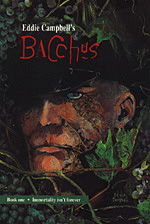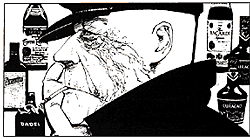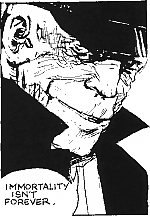
 Writer/Artist: Eddie Campbell
Writer/Artist: Eddie Campbell
Collecting DEADFACE #1-4
Price: $10.95
Publisher: Eddie Campbell Comics/Top Shelf Productions
ISBN: 0958578362
While I'm not that much of a drinker, Dionysus has always been my favourite god. But I can't for the life of me see Dionysus, in his Roman guise as Bacchus, as Eddie Campbell depicts him. Bacchus is supposed to be virile and youthful, the fusing of the masculine and the feminine. Campbell's Bacchus is old and dead-faced, reminding me of Tom Waits most of the time. As he tells one of his new followers: "Immortality isn't forever".
Bacchus is 4000 years old, still kicking around the world. His bacchantes might be a smaller bunch than before, but he's still fond of wine, women and song. He's still the life of the party, telling his stories. And being a Greek god, he's still holding his grudges. He's after Theseus. Theseus, the hero of Athens, the same Thesus who made his way through King Minos's labyrinth and killed the Minotaur at its centre. As the story goes, after killing the Minotaur he runs off with King Minos's daughter, Ariadne, where he later abandons her. Bacchus comes along, falls in love with Ariadne and marries her, never forgiving Theseus for leaving her behind. Luckily, Bacchus can wait a long time.
Today, Theseus, or Joe Theseus as he's now known, is a bearded, eternally young head of an organised crime empire. He knows Bacchus is out to get him, but pre-empts this, sending his own crack team of soldiers out to kill the god of wine, while Theseus himself runs and hides.
 But Bacchus isn't the only one who wants Theseus. The Eyeball Kid, grandson of Argus of the Thousand Eyes, killer of the Olympians, has his own plans for Joe Theseus...
But Bacchus isn't the only one who wants Theseus. The Eyeball Kid, grandson of Argus of the Thousand Eyes, killer of the Olympians, has his own plans for Joe Theseus...
Bacchus is a god trying to relive his glory days, but who knows they are forever behind him. A bittersweet, albeit comical, moment highlights this. A gang confronts Bacchus, who has just retold the tale that Ezra Pound wrote of in his cantos, of being taken aboard a boat, upon which he tangles the sail in vines and shapeshifts into a great cat. He tries to repeat this old trick, but nothing happens. His look of puzzlement is priceless and sad at the same time, and a god is beaten up by a bunch of common thugs.
This regret of things past haunts the three main characters. Bacchus has his stories to tell. Theseus is still sore about not being elevated to the status of god like his fellow hero, Herakles, and The Eyeball Kid, the most powerful creature on earth, who accidentally killed the gods of Olympus and was driven insane by Zeus's power, remains remorseful all the same.
BACCHUS has a confusing history, and I don't mean within the soap operatic epics of Greek mythology. The comic began life in 1986 as DEADFACE, a monthly black and white comic from UK publisher Harrier Comics. Bacchus left DEADFACE for his own comic, and DEADFACE, continuing the adventures of Joe Thesus and the Eyeball Kid, folded a few issues later. The self-titled BACCHUS comic floated around from publisher to publisher, in books such as DARK HORSE PRESENTS, each story created as both a self-contained short story and a piece of the larger whole. This allowed Campbell to tinker and revise his work when he later reprinted the stories in his self-published EDDIE CAMPBELL'S BACCHUS.
 IMMORTALITY ISN'T FOREVER reprints the first four original DEADFACE issues, with the first half following Bacchus around, as he spins tales of the gods and a lot of his own story (and, one suspects, Campbell taking the piss out of the conventions of superhero comics) and never pays for his own drinks, while the second diverges from what the reader expects, following Joe as he is roped into showing the Eyeball Kid the secret to his youthful immortality.
IMMORTALITY ISN'T FOREVER reprints the first four original DEADFACE issues, with the first half following Bacchus around, as he spins tales of the gods and a lot of his own story (and, one suspects, Campbell taking the piss out of the conventions of superhero comics) and never pays for his own drinks, while the second diverges from what the reader expects, following Joe as he is roped into showing the Eyeball Kid the secret to his youthful immortality.
The most interesting thing about BACCHUS is watching Campbell evolve as an artist. His writing is already good: he imbues Bacchus with just the right melancholy and bullshit artistry that the old god deserves. Campbell knows his mythology, with one of Bacchus's new followers, Simpson, an owlish scholar who knows his Euripides back to front, quoting works to do with the god of wine. Most importantly, Campbell doesn't forget the one quintessential element the gods possessed: their humanity. They may have been all-powerful deities, occasionally playing with the lives of mortals for fun, but underneath all the flash and dazzle, their stories are still very much human dramas, full of love and hate and revenge.
Campbell's art, on the other hand, is some way removed from his stellar, atmospheric work on FROM HELL. This is very early Campbell. His lines are straight, but sometimes a little too straight. His action scenes are too flat, his characters move with a strange rigidity. For newcomers to his work, I can imagine that Campbell's art here will not stand up well to his more recent stuff. All the signs of his future style are there though; the nascent scratchy line work, his use of shadow, and in his painted work, collage. The cover of the book, with Bacchus looking out at us from a tangle of vine, is a deceptively beautiful blend of paint and actual grapes and grape leaves. His painted work should be showcased more often.
IMMORTALITY ISN'T FOREVER is just the first book in a longer series of stories about the dead-faced god of wine, and while it not only offers a nice glimpse into the creative beginnings of one of comics best and more underrated talents, it's also the start of one hell of a story - old as it may be - that we can only hope will get even better with age.

This article is Ideological Freeware. The author grants permission for its reproduction and redistribution by private individuals on condition that the author and source of the article are clearly shown, no charge is made, and the whole article is reproduced intact, including this notice.


